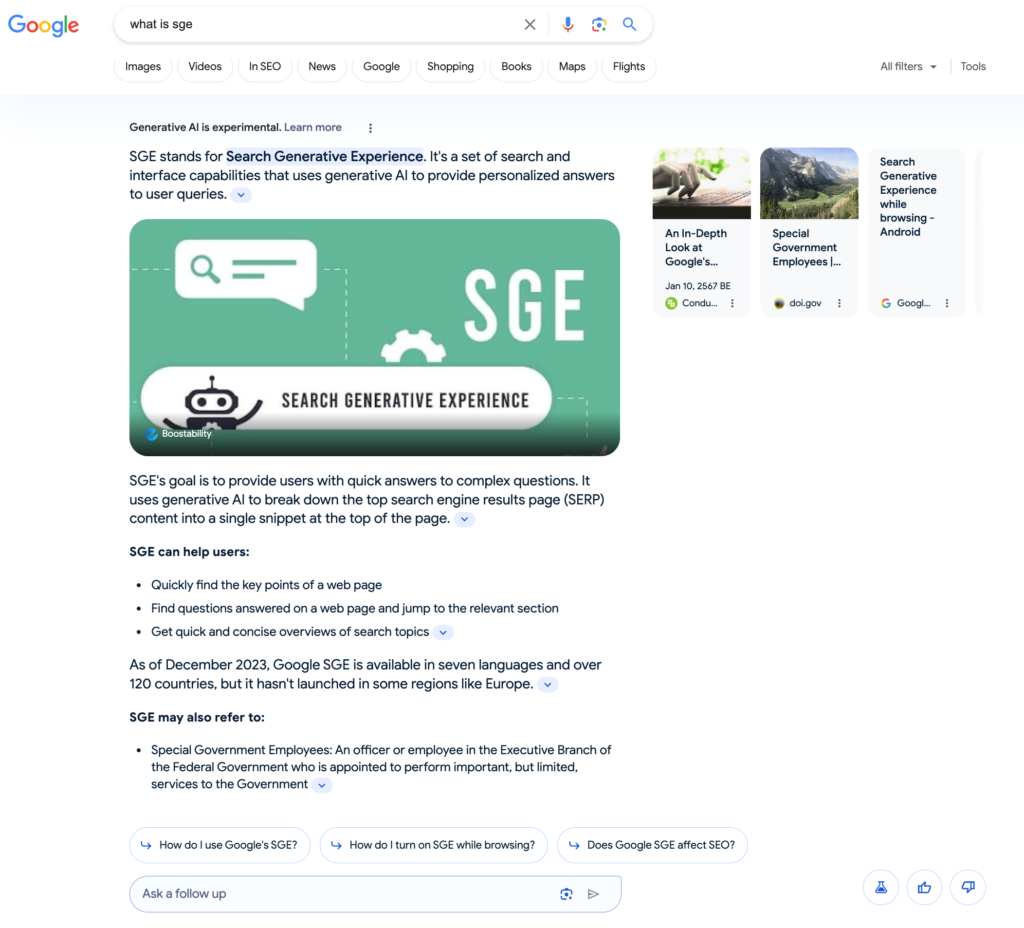Understanding the Challenges and Opportunities of Google’s Search Generative Experience (SGE)
The SEO world first heard about Google’s Search Generative Experience (SGE) in May 2023, when Google announced its new feature. GSE first appeared as an experimental feature, using artificial intelligence (AI) to answer users’ questions directly in the Search Engine Result Pages (SERP).
What is SGE? What difference does it make to your organic web traffic?
How does it impact your SEO results?
How can you best prepare for the SGE?
We answer all these questions below and much more.

What is Search Generative Experience (SGE)?
First of all, you might have heard of Google’s SGE, but do you know what its intent is?
Google is constantly developing and improving its search engine. Businesses with a digital presence have been through many Google updates in the past that have seen a direct impact on their SERP rankings. SGE appears at first to be another update, especially if you’ve noticed a dip in your organic traffic figures.
In reality, SGE will be part of the new face of Google search. It is an experimental search engine feature which is currently using AI technology to provide contextual answers to user queries directly in the SERPs.
Why did Google launch SGE? Google has always made its intention of delivering the best possible user experience clear. As such, SGE fits in the same vein. Built to help users find a response to their queries, SGE uses AI to break down the top SERP content into a digestible response that appears on top of the results page.

Why Google SGE Matters for SEO
It’s not the first time that Google has changed the SERP display, however this is the most significant change in its history. We’ve previously seen Knowledge Graph designed to optimise the user experience of search results. As a result, users may find the answer they need directly in the search engine feature and do not need to visit any website. Consequently, some websites achieve higher rankings by adding valuable information that could be displayed as part of the Knowledge Graph. Other sites, on the other hand, suffered a loss in organic traffic.
Similar to previous SERP features, SGE also has the potential to transform organic traffic patterns. To which degree SGE will impact your organic traffic and SEO results depends on a variety of factors, such as:
- Search intent
- Niche
- Current organic keyword rankings
Why You Can’t Ignore SGE
Here are the top 7 reasons why you can’t afford to ignore SGE:
It changes the search experience: SGE creates a more interactive and conversational search experience for users. It transforms user behaviour, as users could potentially stay on the SERP without needing to visit your website.
It could impact your Click-Through Rates (CTR): If users find the answer they need through SGE AI-generated snippet, they’re unlikely to click on the search results.
You can optimise for AI-generated responses: As SGE becomes more popular, it makes sense to optimise your content to appear in SGE responses.
It helps you understand the user intent: Understanding which questions and which types of search intent trigger SGE will help optimise your content strategy.
You need to adapt to Google’s innovations and features: Ultimately, there’s no way out. Google is currently the number one search engine, so it makes sense to adapt your SEO strategy to stay visible in the SERP. As such, you must leverage your content to make the most of SGE.
Mastering SGE SEO gives you a competitive edge: The sooner you adapt your strategy for SGE, the sooner you can leverage the feature and gain a competitive advantage in the SERP.
It helps you build the SEO strategy of the future: Google’s experimental feature with SGE is the beginning of a new search engine. We can expect to see more AI together with search. The next SGE versions are bound to integrate AI technology further. Now’s the time to proactively plan your SEO strategy around AI.
4 Key SGE Challenges To Know About
SGE may only be in its infancy, but it’s crucial to be prepared and adjust SEO strategies. What are the current challenges you need to consider?
As of November 2023, SGE results can display premium content if Googlebot has access to it. Premium content is only available to paying members. So, if you use a paid content model, this could potentially mean a loss of revenue.
SGE results are changing frequently, whether it comes to the response layouts or the AI triggers. This can make it extremely challenging to optimise your content for SGE.
SGE is still a relatively new feature. The ranking process is still limited. While we know the strong E-A-T (Expertise, Authoritativeness, Trustworthiness) signals to enhance visibility without SGE, the exact criteria for appearing in SGE results are still unclear.
How can you track your website’s performance in SGE? Currently, there is no option to track it and no clear metrics available. As such, fine-tuning strategies may include a lot of trial and error while the SEO community is still in its learning curve.
4 Trends and Insights from SGE
SGE may just be a recent feature in the UK, but we’ve already seen some noticeable SEO trends.
First of all, SGE has driven an increase in eCommerce queries. This is linked to the effort to provide a better user experience in the SERP. SGE could drive more personalised shopping experiences, too. So, SEO experts have noticed an increase in the actual clicks to the organic results below the SGE snippet.
Images play a crucial role in SGE and therefore, they can influence click-through rates. As such, it can be helpful to optimise your visuals with engaging, high-quality, and unique images part of your content strategy.
We’ve already said it, but it’s worth mentioning it again: SGE is still evolving and growing. Early adopters need to remember that SGE is a living organic feature. The bottom line: Your SEO strategy should reflect that.
With more and more responses appearing directly in the search results, SGE can lead to more zero-click searches. Be prepared to adjust your SEO benchmarks accordingly.
How Will SGE Impact Your Organic Traffic?
You can’t avoid it. As Google’s SGE is changing how search results are displayed, it is also changing how users interact with search results. How will it evolve? There’s no telling yet, but there’s no doubt that we need post-SGE SEO strategies.
It is too early to determine the real, long-term impact of SGE on organic traffic. SGE is changing search results. Users are changing how they search, as a direct consequence. The first experiments suggest that SGE can lead to a potential loss of 30% in organic clicks, or even higher.
Actionable Tips for Preparation
As SEO experts, we recommend proactively optimising your website to reduce the risk of losing too much organic traffic. The following SEO activities have shown promising results with SGE:
Building a strong E-A-T score: You can refer to our previous article on E-A-T to get a few ideas on how to get started. Alternatively, it’s worth having an E-A-T audit before you get started.
Answering key questions: SGE opens a conversation by answering questions and creating a dialogue with users. So, if you anticipate follow-up questions on relevant search terms, you can answer them within your content.
Optimising images: SGE loves images and gives preference to engaging content with optimised images.
Staying up-to-date with the SGE feature: As mentioned, SGE is still in its infancy. So, you want to keep monitoring new developments to adapt fast.
Using strategic keyword placement: A popular SEO technique for SGE places the most important keywords and search terms at the start of titles and descriptions. Generally, if it’s something that you are (hopefully) already doing, this will ensure your content is easily accessible for the AI-generated snippet.
Optimising Your Site for SGE Responses
As SGE is on top of the SERP, you are guaranteed the highest visibility. So, what are the best approaches to boost your chances of appearing in SGE?
You can optimise your content for the pre-filled response suggestions within AI results. For inspiration, you may want to check questions appearing in both People Also Ask and SGE sections.
It hasn’t been officially confirmed, but Schema.org best practices are most likely to boost SGE rankings. So, if you’re not using JSON-LD markup already to organise your content, it’s time to include schemas like Article, Person, or Review.
Given the prominence of images in SGE results, we recommend following image SEO best practices.
The Future of Google SGE
We can’t ignore the dynamic and volatile nature of SGE. The feature is still in its experimental stage and has already made waves in the SEO community.
At this point, as part of your digital strategy, we believe that it is crucial to develop an SGE-focused strategy. You need to monitor SGE impact and run in-house testing before you can move forward. Remember, with no guiding metrics available yet, it’s essential to gather data on its triggers for your search audience and redefine your organic benchmarks.
Google is constantly working to improve user experience in the search results. SGE brings AI to the forefront of search, but with the rise of AI tools as part of an SEO strategy, such as generative content and analytics solutions, it appears to make sense for AI to become part of the search results too.
Do you need help preparing for Google’s SGE? Don’t hesitate to contact us or call us on +44 (0) 33 3303 4189, now.

